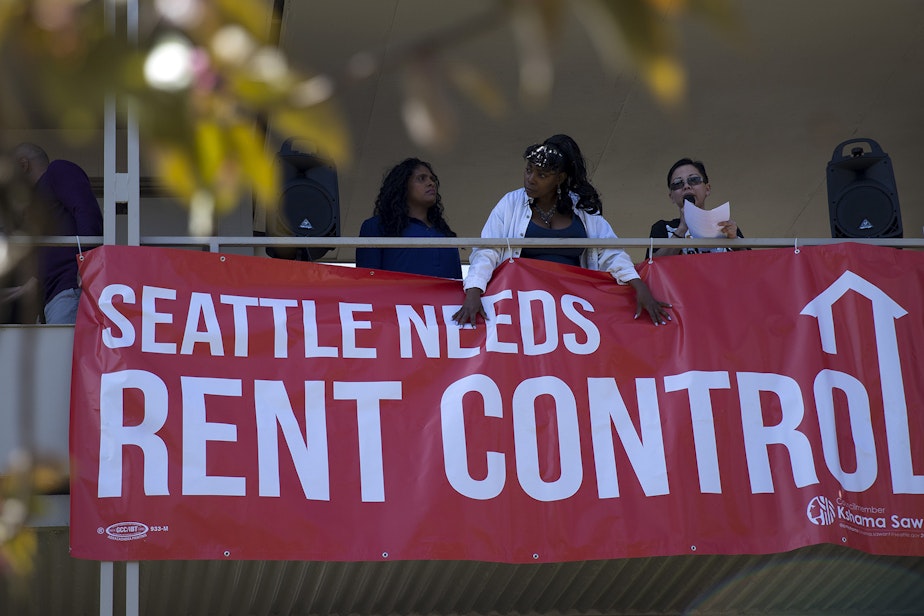It’s Marxist versus Capitalist in Seattle City Council District 3

Rent control is prohibited in Washington state, but that’s not stopping Kshama Sawant, Seattle City Council's socialist member, from fighting for it.
Sawant, an unapologetic Marxist, anticipates a vicious fight for that proposal against developers, and what she calls “the capitalist class.”
But Sawant also faces another big battle this fall: Community leader Egan Orion, who has a less revolutionary, more business-friendly approach to Seattle problems.
Both candidates agree that housing costs are out of control. Median home prices in Seattle are now over $700,000, and rents have jumped almost 70 percent since 2010.
It’s forced some into homelessness, but it’s not just low-wage workers who are being displaced.
April Wilson, a case manager, moved to Capitol Hill, which is in District 3, in 2004. At that time she paid $600 a month for a one-bedroom, 650-square-foot apartment.
Sponsored

About a decade later, Wilson finished graduate school and was earning a “decent middle-class salary.” But she had accrued student debt, and her salary didn't go as far for housing. She was able to find a tiny room in a house shared with seven others for $600 a month.
This year, her aging mom needed extra help. They decided to move in together so Wilson could care for her. But the high cost of housing made Seattle untenable. So they moved to Federal Way, which meant leaving friends and community in Seattle behind.
So what are Seattle leaders proposing to do to tackle the affordability and displacement crisis?
Sponsored
One idea is rent control. Councilmember Sawant is planning to fight for it because, she said, it’s pointless “holding your breath for the for-profit market to address the crisis because the for-profit market is part of the crisis.”
How far would Sawant’s proposal go? Price controls for every apartment in the city, with no exceptions.
“We're not talking freezing rents,” Sawant said. She would tie any rent increases to no more than the cost of living index, which she expects to be around 2 to 3 percent per year.
Typically, that version of rent control is called “stabilization.” But Sawant prefers the bolder phrase “rent control.”
As a member of the Socialist Alternative group, Sawant sees rent control as more than a tool for keeping people in their homes. She believes rent control is a movement.
Sponsored
“A phenomenal educational process for all of us together to understand that big business, the capitalists, the real estate bosses — they are not on your side,” she said.

For Sawant the battle for rent control is a vehicle for raising class consciousness, and part of what the Socialist Alternative sees as the much bigger revolutionary struggle to overthrow capitalism.
Egan Orion, who runs PrideFest, and until recently headed the Capitol Hill Chamber of Commerce, is challenging Sawant. He believes rent control could lead to unintended consequences.
Sponsored
“The classic form of rent control that has been denounced by every economist across the spectrum except for folks like Councilmember Sawant," Orion said.
Rent control "essentially dries up the housing market," he said. "It does the opposite of what it’s intended to do.”
Orion supports a version of rent stabilization. He would allow landlords to increase rents by around 10 percent per year on average.
But landlords in Seattle say that even that version of rent control would be too burdensome.

Bob Weisenbach is a retired architect who owns four buildings in District 3. He said he normally limits rent increases to 3 percent a year. But he’s still opposed to rent control in any form.
He says that’s because rent is the only thing he can control. All of his costs – including property taxes – keep increasing.
He said in one recent year his property taxes for one building went up around 3 percent per apartment per month. Weisenbach said if rent control passes in Seattle he'll probably just cash out and sell his buildings.
That’s the worry, economists say. They argue that rent control can lead to fewer places to rent, and a supply crunch is exactly what got us unaffordable housing in the first place.
But the same economists also acknowledge that short term, rent control help people stay put.
That sounds like sound public policy to April Wilson.
“Families who have dependents, children, family members — they should be able to find a place to live in Seattle,” Wilson said.
Sawant’s public hearing on rent control is at 6 p.m. on Monday, September 23 at Seattle City Hall. A district 3 debate begins at 5:30 p.m. on Thursday at Town Hall Seattle. KUOW will be there.





